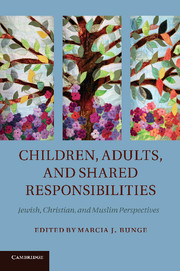Book contents
- Frontmatter
- Contents
- List of Contributors
- Acknowledgments
- Introduction
- PART I RELIGIOUS UNDERSTANDINGS OF CHILDREN
- Chapter 1 The concept of the child embedded in Jewish law
- Chapter 2 Children's spirituality in the Jewish narrative tradition
- Chapter 3 Christian understandings of children
- Chapter 4 Human dignity and social responsibility
- Chapter 5 Islam, children, and modernity
- Chapter 6 Muslim youth and religious identity
- Chapter 7 Imagining childism
- Chapter 8 Talking about childhood and engaging with children
- PART II RESPONSIBILITIES OF CHILDREN AND ADULTS
- Select bibliography
- Index of names
- Index of subjects
- References
Chapter 5 - Islam, children, and modernity
A Qurʾanic perspective
from PART I - RELIGIOUS UNDERSTANDINGS OF CHILDREN
Published online by Cambridge University Press: 05 October 2012
- Frontmatter
- Contents
- List of Contributors
- Acknowledgments
- Introduction
- PART I RELIGIOUS UNDERSTANDINGS OF CHILDREN
- Chapter 1 The concept of the child embedded in Jewish law
- Chapter 2 Children's spirituality in the Jewish narrative tradition
- Chapter 3 Christian understandings of children
- Chapter 4 Human dignity and social responsibility
- Chapter 5 Islam, children, and modernity
- Chapter 6 Muslim youth and religious identity
- Chapter 7 Imagining childism
- Chapter 8 Talking about childhood and engaging with children
- PART II RESPONSIBILITIES OF CHILDREN AND ADULTS
- Select bibliography
- Index of names
- Index of subjects
- References
Summary
The religion of “Islam” can be considered a continuation of religious expression, subsequent to Judaism and Christianity, within the Abrahamic monotheistic tradition. The venture of Islam began with a command to the Prophet Muhammad to “Recite!” (Iqra’). In this sense Muslims see Islam both as an extension and a conclusion of the Abrahamic tradition. The Qurʾān is a foundational text for Muslims around the world and a primary source for learning about Muslim understandings of children and obligations to them. Although there are approximately 1.5 billion Muslims worldwide who live out their faith in diverse countries and cultural settings, they all hold the Qurʾān as authoritative and understand it to be the sacred word of God revealed to the Prophet Muhammad.
While the Qurʾān is central to diverse Muslim communities around the world today, a proper understanding of “the child in Islam” must also be attentive to a number of contemporary realities that inform Muslim perspectives on children. These realities include the deepening awareness of children's rights, child development, and moral agency and the negative effects of corporal punishment or reprimands. A robust Muslim understanding of children should also consider some of the harsh political or social realities that affect children today of all faiths around the world, such as the growing number of AIDS orphans or children in poverty.
- Type
- Chapter
- Information
- Children, Adults, and Shared ResponsibilitiesJewish, Christian and Muslim Perspectives, pp. 99 - 118Publisher: Cambridge University PressPrint publication year: 2012
References
- 1
- Cited by



